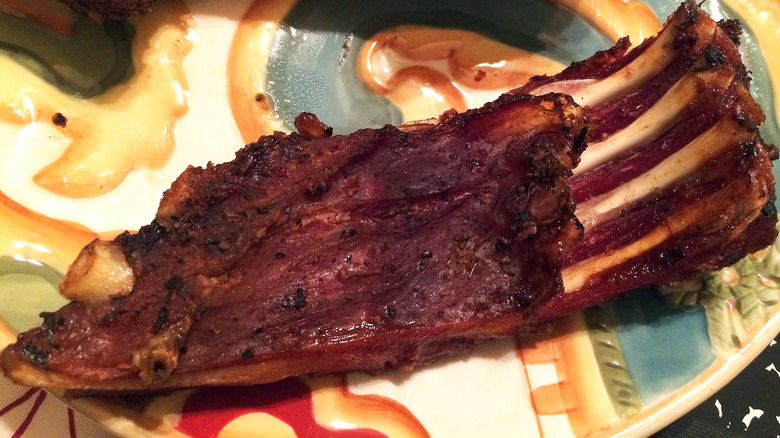Everything You Need To Know About Alligator Meat
Its mere appearance on a menu can be enough to make grown folks give pause and children say, "dare you to eat it." A surefire bucket list item for any adventurous carnivore, alligator meat has earned a legion of fans, and there's never been a better time to try it. Unfortunately, though long served in its native states along the Gulf Coast, alligator meat did not reach a truly national audience until recently. Well into the 2000s, it remained almost exclusive to the southeastern states (via the Atlantic).
However, the popularity of alligator meat took off in the last decade, with the price of alligator meat steadily rising. According to the Wall Street Journal, the trend is largely attributable to the increased exposure alligator meat has received through television and other media. Much of the attention focused on alligator meat's nutritional value, being a strong source of protein that is leaner than beef, pork, and even chicken (via Livestrong). For those who haven't tried alligator yet, the opportunities are only increasing.
Where does alligator meat come from?
In the United States, all alligator meat sold for commercial purposes must come from a farm (via Exotic Meat Market). That's right; alligator farms are a real thing; they just don't get much publicity because "alligator" has too many syllables to fit in 'Old McDonald.' Any alligator meat that you find on a menu or in a grocery store should be farm-raised. Alligator agriculture emerged in the '70s and '80s after widespread hunting had forced alligators onto the endangered species list (via the New York Times). Thankfully, the efforts proved successful, and alligators were removed from the Endangered Species List in 1987 (via the Miami New Times).
However, Arkansas, South Carolina, Louisiana, Florida, Georgia, and Texas still permit private alligator hunting (per Exotic Meat Market), which is strictly regulated by state wildlife agencies. For example, if 'Florida Man' wants to make headlines with some gator-grappling antics, he'll have to apply for permits through the Florida Fish and Wildlife Conservation Commission, each of which limits hunters to two alligators.
What does alligator meat taste like?
Alligator meat tastes like chicken because of dinosaurs. Yes, you read that sentence correctly. "Tastes like chicken" is a cliché way to describe the taste of any unfamiliar food. Still, when it comes to the taste of alligators and other reptiles, the comparison is pretty on the nose. The tail is packed with lean white meat, while the body and legs have tougher dark meat. Both the light and dark meat can carry a faint hint of fishiness, the one thing to distinguish it from poultry.
The reason that alligators and other reptiles taste like chicken lies in their ancestry. Alligators and crocodiles first appeared in the Cretaceous period, about 145–66 million years ago, for a time inhabiting Earth alongside dinosaurs (via the Canadian Broadcasting Corporation). At the end of the Cretaceous, nearly all dinosaurs were wiped out, except for a single group of feathered dinosaurs from which modern birds, including chickens, are descended. Since chickens and alligators share a common ancestor, their DNA is still very similar (via Arizona State University). So, if you've eaten chicken, you have a good sense of what alligator tastes like, and maybe even T-Rex.
Cooking with alligator meat
Alligator, being almost exclusive to the Gulf Coast, plays its most prominent role in Cajun cuisine, per The Atlantic, where it shows up in traditional dishes like gumbo, fritters, and sauce piquante. In Florida, according to Food & Wine, the most popular parts of the alligator are the ribs, prepared in the same fashion as pork spare or baby back ribs. The Atlantic notes that alligator meat is a particularly popular addition to smoked sausages, for which it is often mixed with pork. But the ultimate Cajun experience has to be the alligator boudin balls at New Orleans' Red Fish Grill, blending gator meat with traditional sausage in a deep-fried treat.
This is an awkward pivot from a sentence ending in "deep-fried," but alligator meat is actually quite nutritious, a key factor in its burgeoning popularity. Livestrong reports that alligator meat has a higher protein content and less saturated fat than beef or pork since it comes from a leaner animal. In a comparison of equal-sized alligator and beef steaks, alligator blew away the competition with twice as much protein. With so much to offer, it's surprising that alligator meat managed to keep a low profile for so long.



